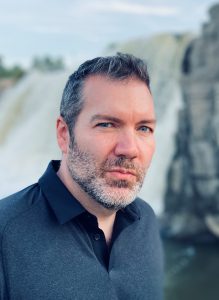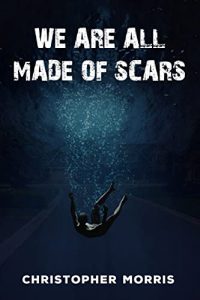
When writing a memoir, the author might wonder how much they should reveal of themselves and how much to hold back. Sharing a story that doesn’t cast us in the best light or is, quite frankly, embarrassing isn’t always easy to do, but it’s often these types of stories that most endear us to readers. Christopher Morris, author of We Are All Made of Scars, shares some of the many ways that vulnerability can build connection and understanding.
Vulnerability is sometimes confused with total honesty. Can you describe how the two are different?
Everything I learned about vulnerability comes from Brene Brown, author and research professor. I encourage readers to check out Daring Greatly (a book I reread once a year) and Braving the Wilderness. She says “the definition of vulnerability is uncertainty, risk, and emotional exposure. But vulnerability is not weakness; it’s our most accurate measure of courage.” I think people can be honest and truthful without being vulnerable. The combination of being emotionally open and honest in writing a memoir is ideal in my opinion. It’s courageous and more compelling for readers.
Why do you think readers value vulnerability in memoirs?
People connect with feelings and emotions. I know in my book, oftentimes I talk about my own confusion, rawness, anger and sadness at my situation or at my alcoholic mother. Many readers have reached out to say they saw themselves in different scenarios in the book. If you think about your favorite books, chances are they have moved you because of the emotional honesty in some way or another.
How can being vulnerable help the author better understand events and people that are part of their personal history?
I think too often people don’t want to fully examine their own life because it’s uncomfortable. It’s not fun to look under all those traumatic rocks along their path! However, you have to “feel it to heal it” as they say. That discomfort is paramount to growth and understanding. I know for myself, laying out my whole story as a teenager grappling with my family’s addictions helped me make even more meaning from the events and why things happened the way they did. By the end of writing, I had more compassion for my family and my younger self. So it was definitely worth it!
Can an author ever be too vulnerable, and if so, how can they recognize when this occurs?
What comes to mind for me is events they haven’t fully processed yet, either for themselves or about other people. You don’t want that to be out in the open if you haven’t worked through it either through therapy or whatever way makes sense. The more you understand your emotions, the stronger your work will be and the better you can write about it. As a related aside, in terms of vulnerability, I think it’s also important to ensure that you are only writing about your own emotions and feelings and not guessing at other’s.
Looking at the opposite approach, how can holding back hinder the author’s work or ability to connect with readers?
Holding back can come off as cold and dry. And fake, unfortunately. Readers will be left wanting more. Who wants that? Describing emotions and being vulnerable is such an important way to talk about a character’s motivation (you) and add deep context for action in a work. Again, it’s also a way for readers to connect with characters instead of just a play by play of events. Being vulnerable in the work will make it far richer and deeper.
Do you think vulnerability can lead to higher empathy and compassion?
No doubt. The more you understand your own emotional landscape and work those muscles, the more you can put yourself in other’s shoes. You start to realize that most people are doing their best. Not only will you be a better writer, but you’ll be a better human in all the ways!
Finally, for those who are inspired to write their own memoir, what is your number one tip for getting started?
First, what part of your story is unique from all the other memoirs? Once you get that down, decide the narrative arc around that thesis and start an outline of events, etc. to work from. Then write away!
To hear more of Chris’s tips and insights, you can listen to his interview on the Writing and Editing podcast.

